Del Ponte: Serbia has will to finalize Hague cooperation
Thursday, 07.06.2007.
18:01

Del Ponte: Serbia has will to finalize Hague cooperation
The arrest of General Tolimir has spurred on great controversy. One of the key questions is that of where was he arrested - in Serbia or in the Republic of Srpska? B92 posed this and other questions to the Chief Prosecutor of the Hague Tribunal Carla Del Ponte.B92: Let's start with the most current topic, the arrest of General Zdravko Tolimir and the great confusion around it. Namely, General Tolimir said from the Hague that he was arrested in Serbia and then taken to the Republic of Srpska and that from there he was taken to the Hague tribunal. Politicians in Serbia staunchly disagree. Can you shed some light in regards to that situation?
Del Ponte: I was informed Thursday afternoon by Prime Minister Dodik who called me to say that Tolimir was in the Republika Srpska. I asked him for some more details about that, and he told me that the police in the Republika Srpska received information about Tolimir crossing the border from Serbia into the Republika Srpska from the Serbian police, and so he was identified and arrested. That is what I received Thursday afternoon from Prime Minister Dodik. Of course, during the day here I received information about the arrest of Tolimir and how he was found in the Republika Srpska, but of course I am not the person to tell you that. What I can tell you is that I’m grateful to the national authorities that made it possible to arrest Tolimir, and I’m particularly grateful for the fact that Tolimir is now in the Hague.
B92: Yesterday you specifically, if I understood correctly, thanked the head of BIA (Security Information Agency), Mr. Rade Bulatović. In relation to that, I would like to ask what he said to you. Are you able to say anything about the means of the arrest or about this controversy which came about in regards to the place of the arrest?
Del Ponte: It is not my role here to tell you that. Ask your authorities because, you know, we were not involved in the arrest of Tolimir. I told you it was a surprise to me. So I think I am not able to answer your questions, and I think that the government will be able to give an explanation for that. I must tell you that I am expecting my fugitives in the Hague. Tolimir is arriving, and I am happy about that because I hope he can be included in the Srebrenica trial with the other six accused, and I’m expecting other fugitives in the Hague.
B92: Okay. Is it of concern to you the way in which Mr. Tolimir was arrested?
Del Ponte: Tolimir was under an arrest warrant, an international arrest warrant, and it was the obligation of all member states of the UN to arrest to Tolimir. So how he was arrested and where he was arrested is for me not a point of discussion. What is important for me is that Tolimir is in the Hague. What is sure is that Serbia contributed to the arrest of Tolimir, and that is a sign of cooperation from Serbia with us. And I take note of that. It was just a few days before I arrived here. It is important that we achieved full cooperation with Serbia, and I think the arrest of Tolimir is an important sign of that.
B92: Did the chief of the VBA (Military Intelligence Services), the coordinator of the Action Plan and the President of the Council for National Cooperation with the Hague Tribunal tell you that they didn’t have any kind of information in light of this arrest?
Del Ponte: I think the arrest was provided in the Republika Srpska. My chief investigator spoke with the chief of police from the Republika Srpska. Because we were involved in the transfer of Tolimir from the Republika Srpska to the Hague, my chief investigator provided contact with NATO and EUFOR to have him transferred to the Hague. That was our involvement - after the arrest, the transfer to the Hague.
B92: But, why did you thank Rade Bulatović yesterday? Why him in particular?
Del Ponte: Because, as I told you before, it was certainly not possible to obtain the arrest of Tolimir without the collaboration of Serbia and the Republika Srpska. Because you know the information we had before was that he was here in Serbia. As it is often the case that our fugitives move from Serbia to the Republika Srpska and back, and even in Montenegro, it is important that the information services share information so that the exact location is known in time.
B92: Do you expect that Mr. Bulatović will arrest General Mladić before you leave the Hague?
Del Ponte: Yes. I had a fruitful discussion with Mr. Bulatović and with the other members of the Action Plan committee and staff because I think that Tolimir's arrest is a good sign of cooperation and it must be followed by the arrest of the other fugitives, Mladić in particular.
B92: But, until now you have asked for his resignation very relentlessly, very consistently, every time.
Del Ponte: No I never asked that. I never asked that. I was complaining directly to him when I was impassioned and nothing happened, as it was more than one year that we had no fugitives arrested. I know that Mr. Bulatović and others are working very hard to obtain that. So months before I was particularly impassioned and I complained to him directly. You know I am not involved in who is doing what in this country. I am not involved in the political issues. That is the responsibility of the government.
B92: I saw a statement in which you said that you sometimes work with politics. That is one point. And the other, I am sure you know that this praise you gave to the chief of BIA came at a very pertinent moment for him, that currently the matter of who will be the new chief of BIA is being decided - whether Mr. Bulatović will remain as chief of BIA or whether he will resign?
Del Ponte: I don’t know. I don’t know. I really don’t know, and nobody spoke with me about that. I had a working meeting with Mr. Bulatović, and I assumed that he would have said something. It is important that he can continue his work now that he has been successful because the fact that last week he could have this information about Tolimir is important. That is experience and history. As you know, I am not involved in that. I am working with the people that the government assigns to work with us.
B92: All right. Ms. Del Ponte, does this event with Mr. Tolimir confirm your earlier thesis and assessment that Serbian politicians, in this moment, if they want, can deliver Mladić and the other fugitives to the Hague?
Del Ponte: That’s exactly correct. We expect now that my other fugitives and particularly Mladić will be located and transferred to the Hague. The arrest of Tolimir shows that they are able to do it. I think that they now also have the political will to do it. You know I was sure about the technical ability of the institution to do it, but I had some doubt as to the real political will. Now I think it is the right time, and I think the government, this new government, has expressed real political will to have the fugitives arrested and transferred.
B92: To clear up one more matter, given that the chief of the Military Intelligence Agency (BIA) didn’t know of this action, nor did the coordinator of the Action plan nor the president of the Council for National Cooperation, in whose hands, when the state is in question, does the power actually lie? Is it only the BIA and Mr. Rade Bulatović, for example?
Del Ponte: I was told many times when we were discussing operations that the Military Intelligence Agency cannot deal with civilians, and the opposite is also true, civilians cannot deal with military. The problem is that former military personnel are no longer under the competence of the Military [Intelligence] Agency. So I don’t know, but for me, as I told you, what is important is the fact that Tolimir is in the Hague, and that must be the important thing for Serbia as well.
B92: You were seen in these last two days with the Prime Minister, with the special prosecutor for war criminals, and with both the heads of the military and civil security agencies. What were the key topics of these conversations? What can you tell us about this?
Del Ponte: I planned to come here first of all because I come more or less regularly. But after we received the engagement on obtaining full cooperation with us from the new government, and because we have some different operative issues to discuss, I came here. And I must say, from the political side, in the meeting with the authorities I received full, full commitment for the achievement of full cooperation, and that is important for me.
It is important for me that, inside the government, a consensus is reached, and it is important for me that President Tadić is the director of the National Security Council, which is a new institution that can be extremely important for the achievement of full cooperation with us. From the political side, as for a positive outcome such as a declaration of full cooperation in the future, I hope that I will be able to assess that very soon. From the other side, the operational side, of course it is more detailed and it is not possible to speak about that here.
B92: When you paid a visit to Belgrade eight months ago you made it clear that there were a few former functionaries who helped Mladić under the protection of the government, if I understood correctly. On what basis are you now speaking? Are you now satisfied? I believe you are reconsidering that premise or maybe you aren’t?
Del Ponte: I think it is an important change because we are not speaking here now in these days about obstacles, political obstacles, in cooperation. We are speaking about how to obtain full cooperation, and I think Tolimir’s arrest is an important sign of this real political commitment to full cooperation with us.
B92: Ms. Del Ponte, on June 18 you will present your report on the cooperation of Serbia with the Hague Tribunal to the Security Council. I know of course you will prepare it after you leave Serbia, but I would like to ask you for your impressions. On the basis of what you have said tonight, can we understand that you are leaving more satisfied than at some earlier points in time?
Del Ponte: It is true that I will report to the Security Council on Monday, June 18. And it is also true that I am more satisfied, of course. You cannot imagine. I was told that Tolimir was difficult to obtain because he had a support network more sophisticated than the others, meaning it would be nearly impossible to arrest him. That was in discussions last year. I even received documents that we requested six months ago, and on Monday I was angry and I told to Minister Ljajić, “I want these documents because there’s no cooperation if you are obstructing the delivery of these important documents, because I have ongoing trials.” And yesterday I received the documents. I have a big box of documents in transit. That is cooperation. And so it is progress for cooperation, and of course I will tell that to the Security Council in my report, but I need now to go on and to see that I will be able to reach a point of full cooperation, and that would mean, in particular, the arrest of Mladić.
B92: When Croatian General Ante Gotovina and Slobodan Milošević were arrested, a bottle of champagne was opened at the Hague Tribunal and in the plane in which they were transported. Do you expect to open another bottle before September when you leave the Hague?
Del Ponte: We have no champagne at the Tribunal. We have an old undrinkable bottle of wine. If we were to be in a place where a bottle of champagne was at our disposal, as it was in the Swiss plane, then yes. Maybe, yes, and maybe no. If I can have all my fugitives arrested, I will be a professionally satisfied prosecutor and not a frustrated prosecutor leaving the Hague.
B92: Okay. You were, as far as I understood, unpleasantly surprised when Serbia was accepted into the Partnership for Peace and when the United States removed the delivery of General Ratko Mladić as a stipulation for the entrance of Serbia into the Partnership. And I saw recently in an interview that you gave with the Ljubljana newspaper Delo that you said you were shocked when you heard that the Slovenian Minister of External Affairs called for the continuation of conversations between the EU and Serbia, even if General Mladić is not in the Hague. Why do you insist so much on that at the expense of the entire population, all the citizens of Serbia, despite the process of individual guilt used by the Tribunal, for which you are the chief prosecutor?
Del Ponte: Politics is important in achieving our work because we need this political pressure to convince the states to cooperate with us. It’s true that it is an international obligation and Serbia, Bosnia and Herzegovina, Montenegro and Croatia should be obliged to cooperate with us. But the reality is extremely different. We need this political pressure. We are following it and trying to maintain it. Sometimes it works, sometimes it doesn’t. I think that in the end, now that only five fugitives remain, I think that it was a good thing in the end, but we are not at the end. We expect Karadžić and Mladić.
B92: But, you are very influential. You are aware of the weight of your words and your assessment. Because of them, no progress can be made on the entrance of Serbia into the EU, nor even the signing of the Stabilization and Association Agreement or a normal continuation of talks with the EU, which you basically put on hold last year.
Del Ponte: No, I disagree with you because it is absolutely a purely political issue. The suspension of negotiations is a political pressure to the government and it has no immediate repercussions or future repercussions for the population. That is not acceptable. It is purely a political issue that can be resolved by the government. And it probably will be resolved.
B92: But, if the United States and the EU are ready for that kind of step, meaning for a continuation of talks without the arrest of Mladić, don’t you at least think you are possibly incorrect?
Del Ponte: But you know I am a prosecutor. I am not dealing with politics. I have a precise mandate from the Security Council so I am trying to fulfill this mandate. Politicians must help me, and if they help me, I can partially achieve this mandate. So you know I am not responsible for politics, and that’s good because I am only a prosecutor, but that is the reason I am sometimes not happy about politics, but politics goes its own way. My role is to inform the politicians and to try to persuade them to understand that they need help because otherwise this tribunal would not even exist or be able to do what we have done and what we must do.
B92: I would like to ask you about two concrete cases in the Hague. Namely, in light of yesterday’s information, one more witness who was summoned in the case against Ramuš Haradinaj refused to take the stand. I have to ask you, in part because of a murder, particularly the death of the witness in that case, and there are obviously pressures present in Kosovo on witnesses, will the Hague be left in the end without any witnesses for this case?
Del Ponte: You know it's not the first time that a witness has refused to testify. There are different reasons, and we use a subpoena if needed, if the judge requires that the witness come. And I think it is also something of a cruel order in the national system, so we deal with it, and if we can renounce the witness we renounce it, because we don’t want to demand that the people go through a judicial order to appear in court. But sometimes we need to have our witnesses in court, so we try our best to preserve the rights of the witnesses and of the victims, but we have the obligation to prove our cases and I am not surprised about this in the case of Haradinaj. I remember fifteen cases with that kind of issue, but we deal with it.
B92: Vojislav Šešelj has been at the Tribunal more than four years, and his case has still not started and certainly won’t begin while you are still at the Hague, it seems. Is the Tribunal obliged to consider human rights or is that left to nongovernmental organizations?
Del Ponte: I remember a case, a financial case, in which the person had five years of detention before the trial, in a financial case. The Court of Human Rights established that this pre-detention was proportional to the case, so it was absolutely decided under the human rights aspect that it was not an overly long pre-trial detention. If you consider that Šešelj is accused of crimes again humanity and war crimes, and if you consider how many victims there are for those crimes, I think that some years of pre-trial detention are absolutely, absolutely proportional. Not to forget that the trial against Šešelj started months ago but Šešelj decided to suspend the trial with his hunger strike, and so we are now obliged to re-start the trial, and that was a decision from the accused. So don’t ask me about human rights in the pre-detention of Šešelj please.
B92: I must take this opportunity to ask you about the denouncement of Geoffrey Nice, the chief prosecutor in the case of Slobodan Milošević. Mr. Nice accused you of collaborating with politicians in Belgrade to hide part of the documents that would have vouched for the participation of Serbia in the wars in Croatia and Bosnia. You dismissed all of the accusations as incorrect, but if they were incorrect, I must ask you, why do you think Mr. Nice, until recently your close colleague, made such a claim?
Del Ponte: This question you must put to him, because for myself, I don’t know why. And I was badly surprised by that because Geoffrey Nice knows that it is not true because he was there. But I have no time to investigate that.
B92: Ok, but now that implicitly brings up one new question, the question of the credibility of the Hague Tribunal. If that man, as you claim, does not speak the truth and has such poor ethics, what should the citizens of Serbia, given that the largest portion of citizens in the Hague for war crimes are citizens of Serbia, what should they think when the credibility of the Tribunal is in question?
Del Ponte: For the interest of the office of the Prosecutor of the Tribunal, we asked the judges of the trial chamber to disclose the documents that prove that there was no deal. We expect the decision from the judges of the trial chambers, so we hope that they will allow us to explain and to prove that.
B92: Do you see that as a kind of scandal for the Hague?
Del Ponte: You know we are used to that kind of maneuver, let's say, but normally they come from the accused or from the outside.
B92: But this came from your own colleague, from the chief prosecutor in the case against Milošević, with whom you worked for years.
Del Ponte: Yes, but what can I say. Nothing. I can say nothing about that. And I will not say anything about that. He’s a former collaborator of our office and, okay.
B92: All right, Ms. Del Ponte, many people in Serbia dislike you, but many dislike you, as far as I know, in Italy and in Switzerland as well. One of the things for which you are known is your investigation into money laundering by the Sicilian mafia in Switzerland, for which the Cosa Nostra lodged half a ton of explosives beneath your house in Palermo. I remember your past because of the money which was exposed from Serbia, which was also the work of the Hague. Politicians in Serbia have convinced citizens that it is impossible today to find traces of that money which was taken from the country during the time of Slobodan Milošević. Do you have doubts about those kinds of claims? It is said that the money has a long trail.
Del Ponte: We conducted a financial investigation of the money and assets of Slobodan Milošević when he was at large, but that was just a temporaneous jurisdiction we had for that kind of financial investigation. When Milošević was arrested we were obliged to stop the investigation, and so I passed all the files, all the documents, all the information to Belgrade because there was a prosecutor, if I remember correctly it was Prosecutor Terzić then, who was conducting a financial investigation of Milošević, also for abuse of power and so on. And of course that means that they have at their disposal these bank accounts that I found and blocked in Cyprus, but unfortunately in six years I have had no reaction from Belgrade. So it is also one of the issues to be discussed here with my colleagues.
B92: Why are you leaving the Tribunal in September? If I understand correctly, that was your decision.
Del Ponte: It was my decision not to renew my mandate which expires in mid September of this year. I think you are asking me why I am leaving. I must tell you, after eight years… Eight years is a long time, and I think I also need some rest because despite the fact that right now I am here for an interview, and it is a pleasant moment, I have a lot to do. And for eight years I have had practically no private life. And I would like to go back a little to a normal life. But I think I have done a lot. Eight years is a long time.
B92: Before you came to the Hague Tribunal you were called several rather ugly names. I hope that you will not be angry, but I will name a few, for example, “New Gestapo” and “Uncontrollable Missile.” And as I already mentioned champagne, what do you think, how many people will be sipping champagne when you leave the Tribunal in September?
Del Ponte: You know, if you have many enemies that means you are a good prosecutor because if you have only friends you need to ask yourself if you are a good prosecutor. You know for me, what you are saying there is just proof that I am doing my job correctly, or that I am trying to do my job in a correct way. And yes, of course it is not only friends who are around me.
B92: I’d like to thank you for the time you have granted the viewers of Television B92.
Del Ponte: Thank you, thank you. Thank you very much.


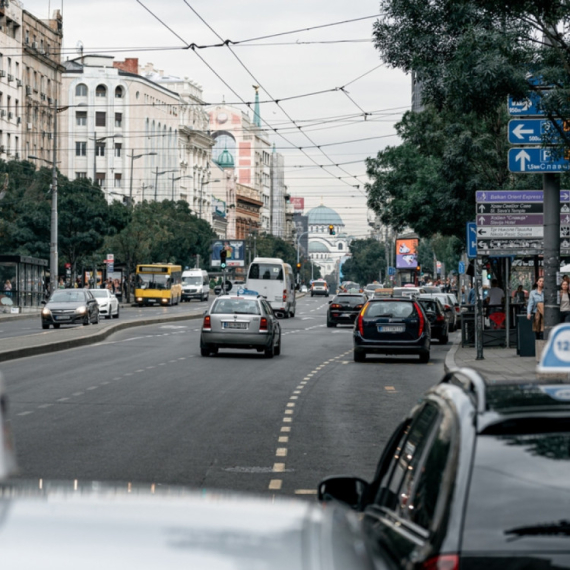
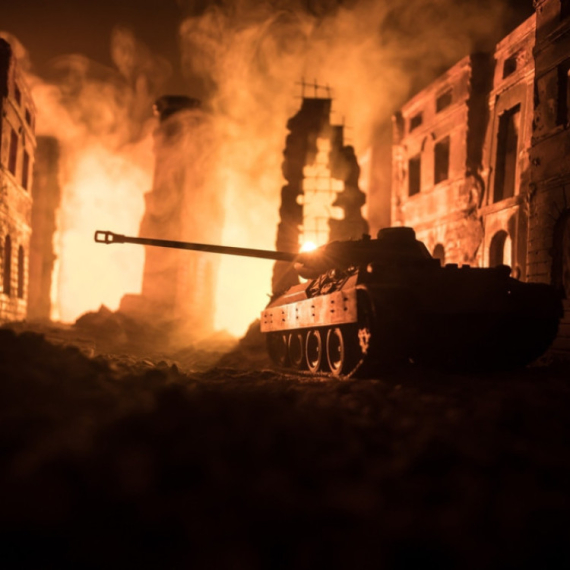
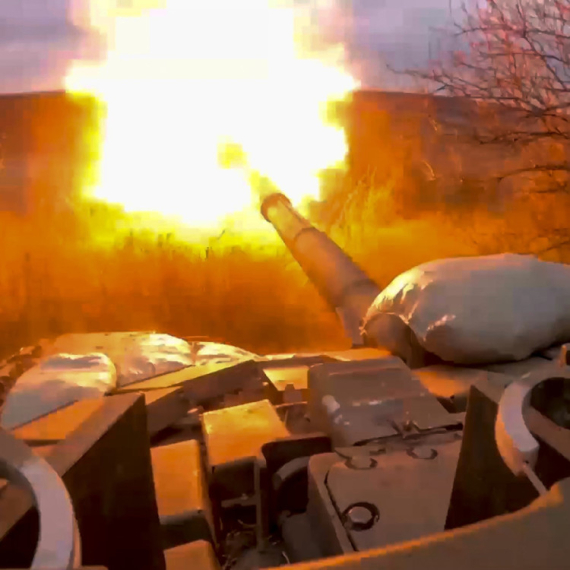
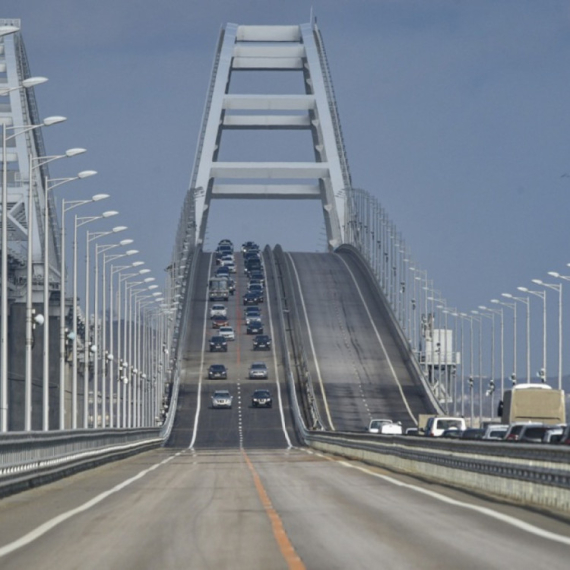




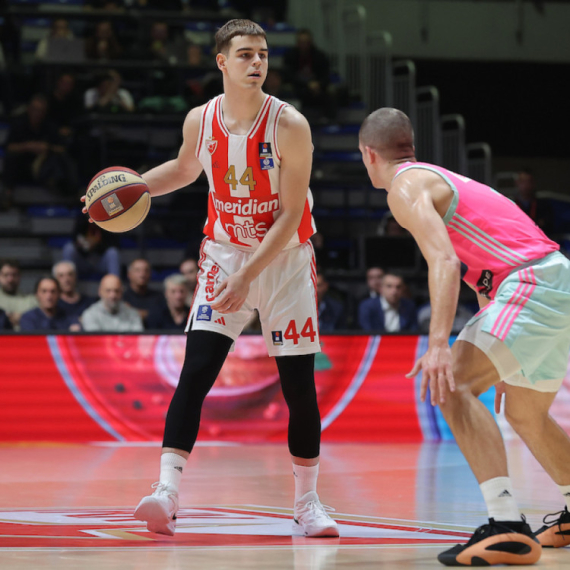



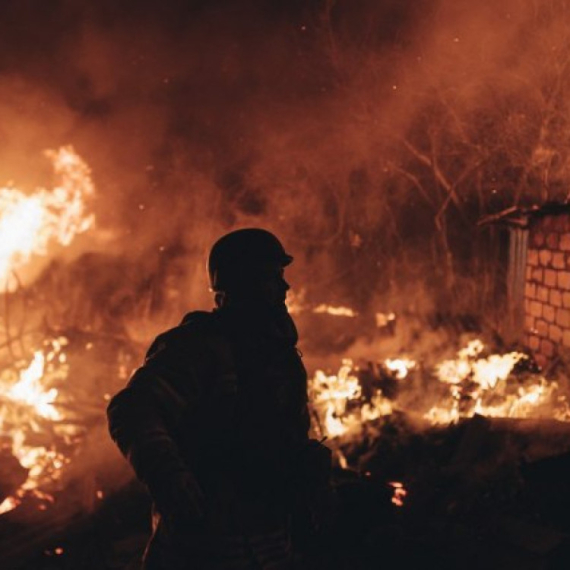

Komentari 0